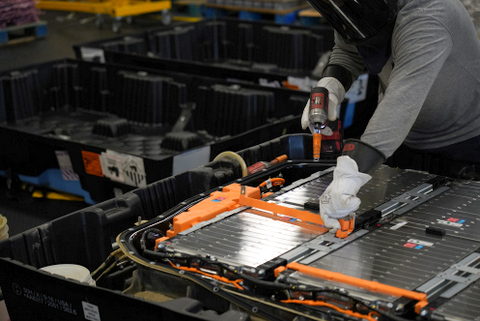Battery Recycling: A Crucial Step Toward Curbing Global Warming
The Circular Economy Needs to Add Batteries
In the fight against global warming and the protection of our environment—and as countries across the world implement mandates for zero-emission vehicles to promote sustainability—battery recycling has emerged as a crucial solution. With such a high level of attention and investment in the mobility sector for the development of batteries to power current and future electric vehicles, the need for safe and responsible battery handling practices is stronger than ever.
To truly pave the way for a more sustainable future, mobility companies–and EV drivers alike–will need to understand that the transition to EVs and the projected positive impact on our world doesn’t end with more EVs on the road. By implementing effective battery recycling programs on a global scale, on top of adopting electric vehicles, we can significantly reduce greenhouse gas emissions, conserve valuable resources and mitigate some of the factors contributing to air pollution and global warming events.

Reducing Carbon Footprint – One of the most compelling reasons to prioritize battery recycling is its potential to curb global warming by significantly reducing carbon emissions. The production of batteries, especially those with high energy density like lithium-ion batteries (the batteries most commonly used for EVs), involves the extraction and processing of raw materials, which often leads to a substantial carbon footprint. By recycling batteries, we can minimize the need for new battery production and, in turn, reduce the associated greenhouse gas emissions.
Conserving Natural Resources – Batteries contain valuable and finite resources such as lithium, cobalt, nickel and rare earth elements. By recycling batteries, we can recover these materials and reintroduce them into the supply chain, reducing the dependence on mining and resource extraction. Mining for these materials has significant environmental impacts, including deforestation, habitat destruction and water pollution. Battery recycling helps conserve natural resources, protect ecosystems and mitigate the environmental damage caused by mining operations.
Preventing Pollution – Improper disposal of batteries can have severe environmental consequences. When batteries end up in landfills or incinerators, they release harmful substances like heavy metals (lead, mercury, cadmium) and toxic chemicals into the soil, air and water. These pollutants pose a significant risk to human health and the ecosystem. By implementing comprehensive battery recycling programs, we can prevent such pollution by safely extracting and managing the hazardous materials within batteries, minimizing their negative impact on the environment.
Promoting Circular Economy – Battery recycling plays a pivotal role in fostering a circular economy – a system aimed at minimizing waste and maximizing resource efficiency. Instead of a linear “take-make-dispose” model, a circular economy promotes the reuse, refurbishment and recycling of materials. By incorporating battery recycling into this framework, we create a sustainable loop where batteries are collected, processed and transformed into new batteries or other products. In the case of EVs, critical materials can be extracted and used to power the next electric car. This approach reduces waste, conserves resources and drives innovation in battery technology.
Boosting Economic Opportunities – The battery recycling industry offers significant economic opportunities. Companies like Cirba Solutions establish robust recycling infrastructure, creating jobs in collection, sorting, dismantling and material recovery. Cirba Solutions encourages research and development in battery recycling technologies, driving innovation and creating new businesses. Moreover, by recovering valuable materials from used batteries, the company reduces the reliance on expensive raw material imports, benefiting both the economy and the environment.
Government Initiatives and Individual Responsibility – To accelerate the adoption of battery recycling, governments must implement supportive policies, such as financial incentives and regulations mandating proper disposal and recycling. The Biden Administration has moved us in the right direction with the Inflation Reduction Act (IRA), however, the lack of collection of batteries is still a major challenge. Additionally, manufacturers and consumers play a vital role by ensuring the responsible disposal of batteries and actively participating in recycling programs. Through collective efforts, we can establish a sustainable ecosystem that maximizes the environmental benefits of battery recycling.
Battery recycling represents a critical step in curbing global warming and protecting our environment. By reducing carbon emissions, conserving natural resources, preventing pollution and promoting a circular economy, battery recycling addresses the root causes of climate change and environmental degradation, including factors that lead to the occurrence of wildfires and the subsequent smoke that impact millions of people. Governments, manufacturers and individuals must collaborate to establish comprehensive recycling systems and prioritize the responsible management of batteries. Together, we can build a sustainable future that safeguards our planet, mitigates the impacts of climate change and protects communities from the harmful effects of wildfires, smog and smoke.

order lasuna pill – himcolin online order purchase himcolin pills
how to get gabapentin without a prescription – cost sulfasalazine 500 mg buy azulfidine 500mg generic
order generic benemid 500 mg – carbamazepine pill buy carbamazepine without prescription
purchase celebrex without prescription – celecoxib price buy indomethacin 75mg generic
buy mebeverine 135 mg online – arcoxia price buy pletal 100mg online cheap
oral voltaren – buy aspirin paypal aspirin 75mg without prescription
rumalaya without prescription – buy elavil without a prescription buy amitriptyline 50mg without prescription
where can i buy diclofenac – brand imdur 40mg buy generic nimotop over the counter
baclofen drug – buy piroxicam cheap order feldene
meloxicam 15mg sale – order maxalt 10mg for sale buy ketorolac online
periactin 4mg for sale – buy periactin online cheap buy tizanidine online
artane usa – artane medication emulgel online order
isotretinoin 20mg us – dapsone 100mg price order deltasone 5mg without prescription
deltasone 5mg generic – prednisone 10mg for sale order zovirax online
acticin usa – acticin sale retin gel usa
betamethasone 20 gm generic – generic betamethasone 20gm order benoquin online cheap
purchase flagyl – cost cenforce 100mg cenforce for sale
purchase amoxiclav – buy clavulanate generic cost synthroid
buy cleocin 150mg sale – order generic cleocin 300mg buy indomethacin 75mg online
generic losartan – buy cephalexin 500mg for sale cephalexin 500mg cost
order crotamiton cream – order bactroban ointment without prescription order aczone online
modafinil 200mg for sale – buy phenergan online cheap melatonin 3 mg us
order bupropion 150 mg online – order bupropion 150mg online buy generic shuddha guggulu online
buy fosamax generic – alendronate 70mg cheap buy medroxyprogesterone generic
norethindrone tablet – norethindrone 5 mg pill cheap yasmin generic
brand estradiol 2mg – buy letrozole 2.5mg sale anastrozole ca
dostinex price – order premarin sale buy alesse paypal
eriacta burden – apcalis sam forzest soup
indinavir pill – emulgel purchase online purchase emulgel cheap
valif boat – buy sustiva online cheap buy sinemet 10mg sale
buy provigil 100mg for sale – order modafinil 200mg pills order epivir pill
ivermectin 3 mg for humans – carbamazepine oral cost tegretol
buy phenergan pills for sale – promethazine over the counter oral lincomycin 500mg
brand accutane 40mg – buy dexona paypal zyvox uk
neurontin drug – buy gabapentin 800mg sale itraconazole 100mg cost
cheap augmentin 1000mg – buy ketoconazole 200mg generic cymbalta 40mg tablet